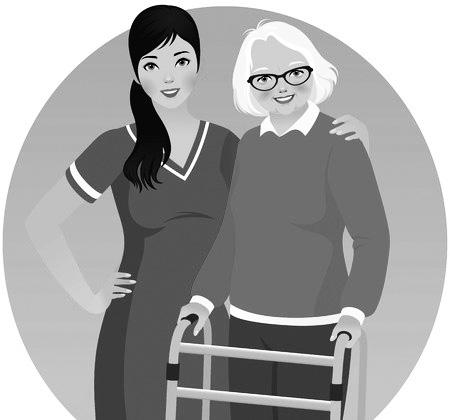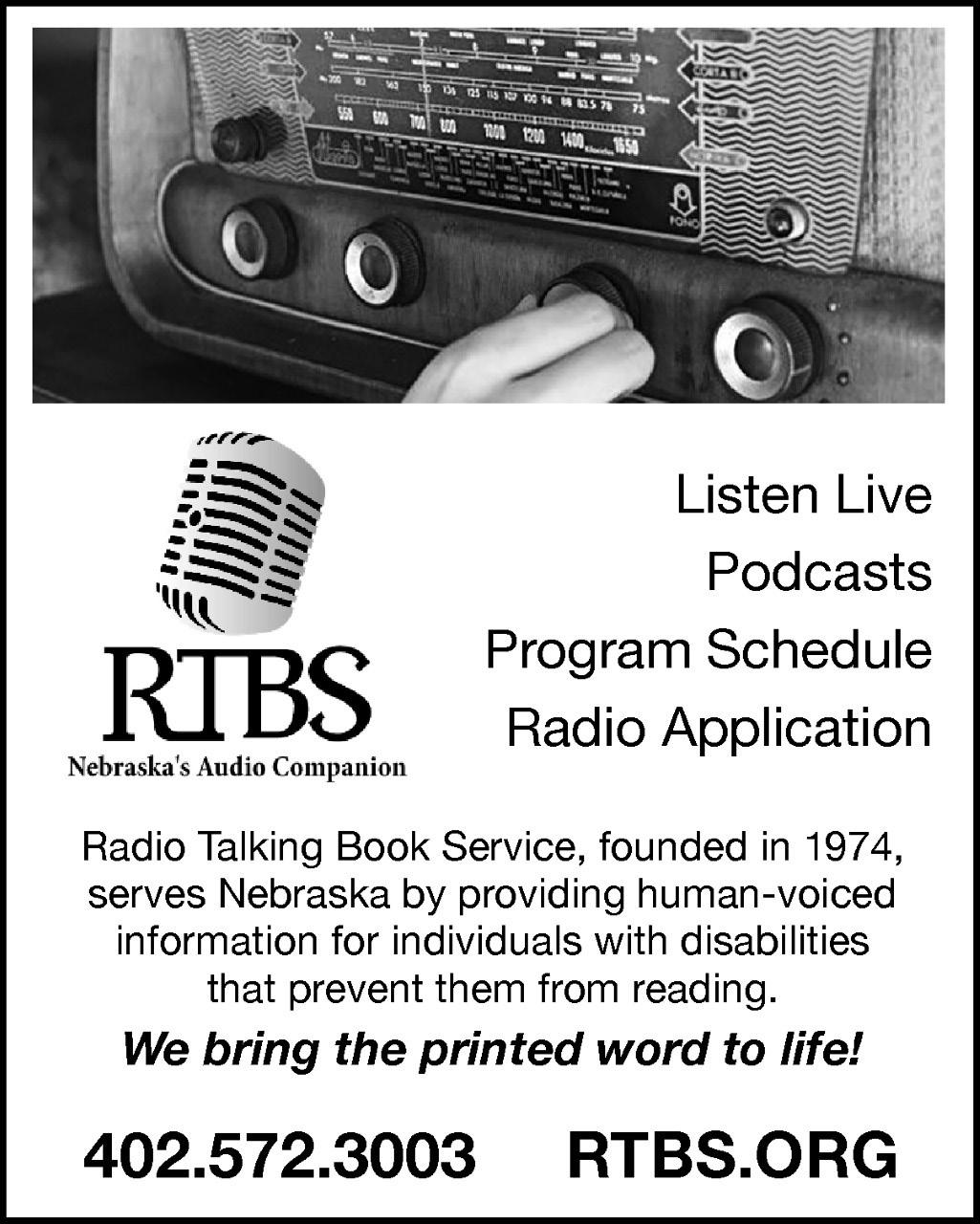
6 minute read
Nancy Hemesath’s Conscious Aging
UNO’s Department of Gerontology recruiting older adults, caregivers for research on social processing
The University of Nebraska Omaha’s Department of Gerontology is looking for healthy adults and caregivers for an older adult with a chronic disease (dementia, cancer, cardiovascular disease, etc.) to participate in a research study about the impact of aging on the neural and behavioral bases of social processing.
Advertisement
The study includes an online, at home component (seven hours over four days) and one in-person visit (two hours and 30 minutes) which will take place at the University of Nebraska Medical Center.
The experiment involves online questionnaires and interviews, computer tasks, saliva collection for hormone analyses, a blood draw, and brain imaging.
Participants must be ages 19 to 90, able to comprehend written and spoken English, have the mobility to travel to UNMC, and have completed a minimum of two years of high school or higher.
Persons with a neurological or psychiatric disease (stroke, depression), drug abuse issues, are taking an antidepressant medication, using cortisone/prednisone, are on hormone replacement therapy, have vision, hearing, cognitive, or motor difficulties, are pregnant or breastfeeding, or who have metal implanted in their body aren’t eligible to participate in this study.
Compensation for study participation is available.
Parking is complementary and located a short walk from the building where the experiment will take place.
For more information, please contact Janelle Beadle, Ph.D. at 402-554-5961 or ABELabUNO@gmail.com.
Sometimes, when the weather changes, I’m reminded of past physical injuries. The ankle I broke in my 30s stings a little as does the wrist I broke when I was 70. There are other reminders my body has been through the mill. I limp a little since I broke my hip. I have other surgery scars. All of these reminders are occasions for me to give thanks for the resilience of the human body and for good medical care.
In our Third Chapter of Life, we carry reminders of the events in our lives that hurt us both physically and emotionally. Truthfully the memories of the physical hurts are easier to handle. It’s the memories of emotional hurts that can really drag us down.
The two kinds of emotional hurts I want to discuss here are regrets and unforgiveness. Regrets are often the “woulda-coulda-shoulda” conversations we carry on in our


heads. “If only I had married my first love, my life would have been happier.” “If only I had saved more for retirement, I would be more comfortable.” “If had been more patient with my children, we could have a better relationship now.” “If only I had visited my ailing mother more often, she would have been happier.”
The guilt trips continue but there’s no benefit from this expended energy. I suggest there are two things we can do when we experience regrets. The first is to forgive ourselves because we know more now than we did then. Most of us did the best we could with what information and circumstances we had at the time. Judging ourselves in hindsight only depresses us.
On the other hand, now that we know more, we can apologize if an apology is called for. Whenever possible we can take care of old business. We also have new opportunities to reach out to others so there will be no new regrets in our lives. Perhaps our mother is deceased, but her sister would love to have us visit.
The other emotional hurts we carry come from people we’ve never forgiven for past offenses. We may not even remember exactly what caused the hurt. Nevertheless, these old, buried feelings sap our energy deep below the surface. Families may be divided over money or some other slight leaving siblings at odds through the years. In our elder years, these grudges can haunt us, leaving us unpeaceful. Often people don’t know what to do with these old hurts.
Here is six-step process that has the potential to heal us and bring us peace. First, uncover the feelings we buried. Allow oneself to feel what we felt then and what we feel now. Writing feelings and thoughts down is a great way to get them out. Be honest about what we’re feeling—this isn’t the time to pretend the hurt isn’t there.
Secondly, we notice what the lack of forgiveness has done to our own spirit. Have we become hardened or cynical? Just notice.
Third, we make a commitment to forgive. This is a decision we’re capable of making if we want to be at peace.
Fourth, we spend some time looking at the offender’s humanity. Besides that bad thing, what are the redeeming qualities of this person? What do we like or admire if we allow ourselves to do so? Each person is more than any mistake he or she has made.
The fifth step is challenging. We ask ourselves if we’re responsible in any way for the hurt that was perpetrated. Many times, we can see how we contributed to the situation. Maybe I provoked the person or perhaps I was too passive. In the case of abuse, it’s important not to blame ourselves for what the other did.
Finally, we offer our forgiveness to this person within our own hearts and minds. Some gesture to represent forgiveness is helpful in putting closure on the event. Once we’ve forgiven, it’s important not to go back and stir up the old hurt. Continuous forgiveness means we let go whenever the old thoughts arise.
The physical scars I carry really don’t bother me that much and, with care, I can be rid of the old emotional scars and be at peace. (Hemesath is the owner of Encore Coaching. She is dedicated to supporting people in their Third Chapter of Life and is available for presentations. Contact her at nanhemesath@gmail. com.)
Conscious Aging
By Nancy Hemesath
Intercultural Senior Center
You’re invited to visit the Intercultural Senior Center (ISC), 5545 Center St.
The facility – open weekdays from 8 a.m. to 4:30 p.m. – offers programs and activities Mondays through Fridays from 8 a.m. to 3 p.m.
Participants must be fully vaccinated against COVD-19 to attend the ISC. Participants are asked to bring their vaccination cards with them when visiting the ISC.
The ISC offers a light breakfast, lunch, fitness classes, programs, and activities. Lunch reservations are due by 9 a.m. A voluntary contribution is suggested for the meal. Please call 402-444-6529 for reservations.
The center will be closed Nov. 11 for Veterans Day and Nov. 25 and 26 for Thanksgiving.
Monthly food pantries are available for adults ages 50 or older.
ISC’s SAVE bus can bring case management services to your doorstep.
For more information, please call 402- 444-6529. Hemesath program is set for Nov. 10

Nancy Hemesath’s presentation on retirement being the Third Chapter in Life is scheduled for Wednesday, Nov. 10 at Resurrection Evangelical Lutheran Church, 153 S. McKenna Ave. in Gretna. The social hour, which begins at 1:30 p.m., will be followed by the program at 2.
Hemesath will discuss retirement as a time for wholistically developing the parts of life that have sometimes been neglected due to our work-life responsibilities.
For more information, contact Hemesath at nanhemesath@gmail.com.




